
'Urgency of action': pressure grows for COP28 climate deal

UN climate talks negotiators were under growing pressure on Sunday as the deadline nears to strike a new global deal aimed at keeping global warming within 1.5 degrees Celsius.
Before COP28's scheduled finish on Tuesday, officials warned progress was too slow as a critical dispute remains -- whether to include language on the winding-down of fossil fuel production.
- 'Most ambitious version' -
Germany's chief negotiator Jennifer Morgan urged the United Arab Emirates' COP28 presidency, led by state oil company CEO Sultan Al Jaber, to push for the "most ambitious" agreement.
"There is a real urgency of action to keep the planetary pain threshold of 1.5 degrees in reach," she said.
"Today is the day the presidency takes over primary responsibility for figuring out what the most ambitious version of an outcome package can be at this COP.
"The COP presidency has reiterated many times that they are here to facilitate an ambitious decision. This means there needs to be strong language on the phase-out of fossil fuels in line with 1.5C."
- 'Deep cuts' -
United Nations Secretary-General Antonio Guterres urged COP28 delegates to agree big cuts to emissions and called on oil and gas companies to lead the renewable energy transition.
"I urge fossil fuel companies to use their enormous resources to lead the renewables revolution," he told the Doha Forum in Qatar.
"And I urge global leaders at COP28 in Dubai to agree on deep cuts to emissions in line with 1.5 degrees. That is the only road not only to climate sustainability, but economic sustainability."
- 'Not nearly enough' -
The International Energy Agency said non-binding pledges made by governments and the oil and gas industry so far at COP28 would reduce energy-related greenhouse gas emissions by only 30 percent of what is needed by 2030.
"While the pledges are positive steps forward in tackling the energy sector's greenhouse gas emissions, they would not be nearly enough to move the world onto a path to reaching international climate targets, in particular the goal of limiting global warming to 1.5 degrees Celsius," it said.
The agency released an assessment of non-binding promises made in Dubai: tripling renewable energy and doubling energy efficiency by 2030, as well as sharp cuts in methane emissions.
According to the UN climate body, 130 countries have signed on to the pledge on renewables and energy efficiency.
- 'Small minority' -
A small minority of countries at the UN climate talks are blocking a growing consensus to phase out fossil fuels, at-risk Vanuatu's climate change minister told AFP.
"The majority here wants fossil-fuel language, language that takes us away from fossil fuels, that indicates a desire for us to move according to the science, according to the 1.5 degree target," Regenvanu said, adding that talks were at a "critical stage".
"So that is the will of the majority. We need the small minority of countries that is blocking progress to shift the position, and that's what we're working on for the next couple of days."
The low-lying Pacific islands nation faces a severe threat from rising sea levels and has been battered by three tropical cyclones this year, including a category-five storm in October.
- OPEC protest -
A small group of demonstrators briefly invaded the OPEC pavilion, calling for the phase-out of fossil fuels.
Half a dozen activists staged their protest two days after revelations that OPEC had urged its members to "proactively reject" a phase-out.
"We know that OPEC sent a letter to its members, asking them to reject a phase-out of fossil fuels, and we think it's a bad sign," Nicolas Haeringer of the 350.org NGO told a startled group of visitors.
"For us, having an OPEC pavilion at COP is like having a huge oil well in the negotiations."
- Pollution soars -
The world's tallest building, Burj Khalifa, was again shrouded by smog as Dubai's air pollution hit "unhealthy" levels, according to the WAQI.info tracking site.
The reading of 152 micrograms per cubic metre of PM2.5 pollution -- the fine particulate matter that is most harmful as it can enter the bloodstream -- is well above levels considered safe by the World Health Organization.
In "unhealthy" air quality, "everyone may begin to experience health effects; members of sensitive groups may experience more serious health effects", WAQI.info warns.
Last week, a Human Rights Watch report citing analysis of government air quality data and satellite imagery said the UAE suffers "alarmingly high" pollution levels fed by its fossil fuel industry.
A. Williams--BTZ

 London
London

 Manchester
Manchester
 Glasgow
Glasgow
 Dublin
Dublin
 Belfast
Belfast
 Washington
Washington
 Denver
Denver
 Atlanta
Atlanta
 Dallas
Dallas
 Houston Texas
Houston Texas
 New Orleans
New Orleans
 El Paso
El Paso
 Phoenix
Phoenix
 Los Angeles
Los Angeles



